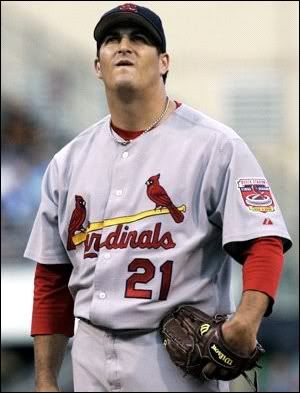
In a word, this rant (or blogpost as some of you people like to call it) can be summarized as idiotic. The Man, Jim Hendry decided that it was a good move signing Jason Marquis for three years and twenty-one million dollars. I can't even begin to describe how bad this is financially. It is no secret that Marquis sucks, but magically he won fourteen games last season and that's, sadly, a stat that Hendry pays attention to. Marquis had a WHIP over 1.50 and an ERA over 6.00. Yet, somehow our brilliant GM decides to give him a contract worth seven million a year annually.
JH validated this by saying that "He was going to get $20 to $21 million from three or four different [teams]; that was a definite." Well JH, if everyone jumped off a cliff would you? I guess yes, because you just did. JH dug himself further into the hole by arguing that "a lot of precedent [was] set way before Jason [Marquis]. Adam Eaton got $8 million [a year], and Gil Meche got $11 million [a year], and there were a lot of people in between. Certainly over a three-year look back, Jason's statistics, and wins, certainly validate that kind of a salary."
Wins? Obviously there was a significantly added advantage that Jason Marquis on his win column over some 'lesser' pitchers like the aforementioned Adam Eaton: Albert Pujols, Jim Edmonds and Scott Rolen. One of these days JH is going to realize that there are two parts to each baseball game, run production and run prevention. Pitchers (usually) only impact the prevention part of the equation, and defense affects prevention so he's factoring in on less than half of the games. Marquis can hit, but that does not negate the six plus earned run average he had.
Also, one of the most retarded things that can be done is project ERA using ERA. It's a statistic with a very high amount of volatility from year to year. Also, it's not a true indication of how good a pitcher produces. The Cardinals are renowned for having one of the better defenses in baseball the last few seasons, and most GMs don't seem to account for defense on a pitcher's ERA. Also ERA in it of itself is flawed. Generally speaking errors are relatively predictable based on things like GB rates, etc. RA is much better and using RA for Marquis seems more useful considering his (prior) high groundball tendencies.
Looking at RA for 2006 is pointless, he's terrible no matter how you slice it. Looking at RA for 2005 shows him to be a little below average RA+ wise relative to the suggestion that his ERA+ makes (103). Regardless, he was lucky. There are essentially three things that go along with projections for pitchers. First, strikeout rates. The ability to limit balls in play cannot go underestimated. Due to the nature of a BABIP, the batting average on a strike out is zero. The batting average on a dribbler in the infield is over .250. Secondly, walk rates. Walks can be a useful tool in the NL, but certainly not in the American League as there isn't a pitcher. Still, putting runners on base in any situation is stupid. Finally, groundball rates do matter as they are nearly directly tied to flyball rates which connect to home run output.
In order to succeed in the majors, you usually need to possess two of the three at a good rate. Sometimes your high K pitchers can get on by just an elite K rate that's several standard deviations above the mean. Marquis on the other hand has seemingly possessed none of them for most of his career. Marquis' strikeout rate has been below average for his entire career. It's not a new development and it has continued. Marquis' walk rates have been below average for most of his career. He did have some nice GB rates in 2005 and 2004, but he didn't possess that in this season. Obviously when you have none of the three you won't last long in the majors. IF Larry Rothschild found the flaw in his sinker, then I'll concede that he can have that skill back somewhat. It's not a 95th percentile skill, but 80th which is pretty good. However, he's probably never going to acquire the other two - which are more important. The prognosis based on that isn't good. His ERA is probably going to be in the high fours and damn close to five.
Now, last season we had guys like Sean Marshall, Angel Guzman and others combine for worse numbers than five ERA's. But once again we shouldn't look at that to make our decision. Sean Marshall actually outproduced Marquis last season in ERA, and is 24 years old and will get less than $400,000 next season. Angel Guzman bottomed out last season. He showed flashes of dominance and certainly had the stuff to survive in the majors - no one doubts that. Given the circumstances he was fine. He essentially was out for two season due to injuries, and then made the jump from AA to MLB. It's hard to make that jump without missing two seasons. A rocky beginning to his career should have been expected. However on the triple a circuit he was dominant. And he's continued that run of success into the winter season in VWL where he currently sports a nifty 21:4 K:BB.
At the bottom end Guzman probably has an ERA around 5.15 next sason with potential for a lot more. If he's at 5.15 and you factor in "less" durabitlity which means decent RPs coming in an for an extra inning, that combined ERA in Marquis timeframe of 4.90 would be the same. Guzman is also a great breakout candidate this season and we choked him off for this year by signing Marquis.
Terrible.
JH validated this by saying that "He was going to get $20 to $21 million from three or four different [teams]; that was a definite." Well JH, if everyone jumped off a cliff would you? I guess yes, because you just did. JH dug himself further into the hole by arguing that "a lot of precedent [was] set way before Jason [Marquis]. Adam Eaton got $8 million [a year], and Gil Meche got $11 million [a year], and there were a lot of people in between. Certainly over a three-year look back, Jason's statistics, and wins, certainly validate that kind of a salary."
Wins? Obviously there was a significantly added advantage that Jason Marquis on his win column over some 'lesser' pitchers like the aforementioned Adam Eaton: Albert Pujols, Jim Edmonds and Scott Rolen. One of these days JH is going to realize that there are two parts to each baseball game, run production and run prevention. Pitchers (usually) only impact the prevention part of the equation, and defense affects prevention so he's factoring in on less than half of the games. Marquis can hit, but that does not negate the six plus earned run average he had.
Also, one of the most retarded things that can be done is project ERA using ERA. It's a statistic with a very high amount of volatility from year to year. Also, it's not a true indication of how good a pitcher produces. The Cardinals are renowned for having one of the better defenses in baseball the last few seasons, and most GMs don't seem to account for defense on a pitcher's ERA. Also ERA in it of itself is flawed. Generally speaking errors are relatively predictable based on things like GB rates, etc. RA is much better and using RA for Marquis seems more useful considering his (prior) high groundball tendencies.
Looking at RA for 2006 is pointless, he's terrible no matter how you slice it. Looking at RA for 2005 shows him to be a little below average RA+ wise relative to the suggestion that his ERA+ makes (103). Regardless, he was lucky. There are essentially three things that go along with projections for pitchers. First, strikeout rates. The ability to limit balls in play cannot go underestimated. Due to the nature of a BABIP, the batting average on a strike out is zero. The batting average on a dribbler in the infield is over .250. Secondly, walk rates. Walks can be a useful tool in the NL, but certainly not in the American League as there isn't a pitcher. Still, putting runners on base in any situation is stupid. Finally, groundball rates do matter as they are nearly directly tied to flyball rates which connect to home run output.
In order to succeed in the majors, you usually need to possess two of the three at a good rate. Sometimes your high K pitchers can get on by just an elite K rate that's several standard deviations above the mean. Marquis on the other hand has seemingly possessed none of them for most of his career. Marquis' strikeout rate has been below average for his entire career. It's not a new development and it has continued. Marquis' walk rates have been below average for most of his career. He did have some nice GB rates in 2005 and 2004, but he didn't possess that in this season. Obviously when you have none of the three you won't last long in the majors. IF Larry Rothschild found the flaw in his sinker, then I'll concede that he can have that skill back somewhat. It's not a 95th percentile skill, but 80th which is pretty good. However, he's probably never going to acquire the other two - which are more important. The prognosis based on that isn't good. His ERA is probably going to be in the high fours and damn close to five.
Now, last season we had guys like Sean Marshall, Angel Guzman and others combine for worse numbers than five ERA's. But once again we shouldn't look at that to make our decision. Sean Marshall actually outproduced Marquis last season in ERA, and is 24 years old and will get less than $400,000 next season. Angel Guzman bottomed out last season. He showed flashes of dominance and certainly had the stuff to survive in the majors - no one doubts that. Given the circumstances he was fine. He essentially was out for two season due to injuries, and then made the jump from AA to MLB. It's hard to make that jump without missing two seasons. A rocky beginning to his career should have been expected. However on the triple a circuit he was dominant. And he's continued that run of success into the winter season in VWL where he currently sports a nifty 21:4 K:BB.
At the bottom end Guzman probably has an ERA around 5.15 next sason with potential for a lot more. If he's at 5.15 and you factor in "less" durabitlity which means decent RPs coming in an for an extra inning, that combined ERA in Marquis timeframe of 4.90 would be the same. Guzman is also a great breakout candidate this season and we choked him off for this year by signing Marquis.
Terrible.

